
All categories
Featured selections
Trade Assurance
Buyer Central
Help Center
Get the app
Become a supplier

(1540 products available)


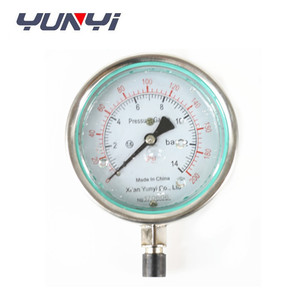





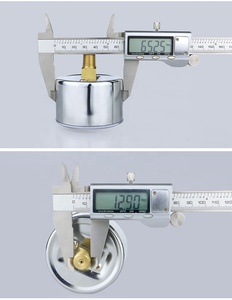

























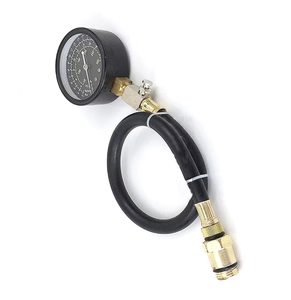





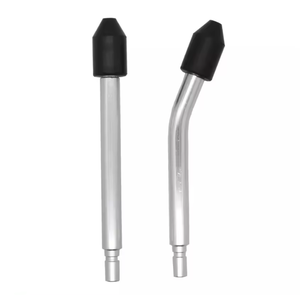


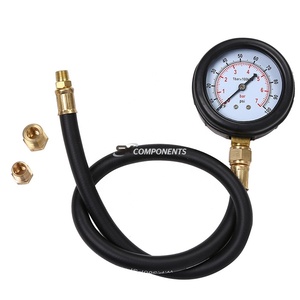


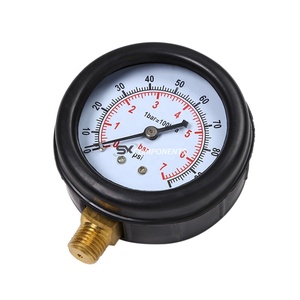
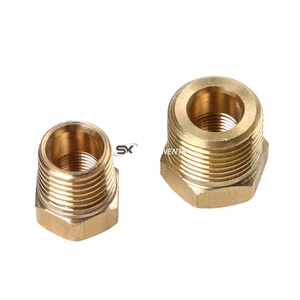
Compressed gas pressure gauges are vital in different industries. With this, they help monitor gas pressure in systems. These gauges help ensure safety, system performance, and accurate operation. This is especially true during gas manipulation for various applications.
Notably, these gauges come in diverse categories. They include analog, digital, heavy-duty, and differential pressure gauges. Each type is suited for a particular application. Moreover, it helps accommodate diverse operational requirements.
Most of these gas pressure gauges use a mechanical system to show pressure. Usually, they are depicted on a dial with a pointer. These gauges are favored for their simplicity. In addition, they have dependability, and ease of use. Users understand the pressure levels quickly from the visual dial. Nevertheless, analog gauges are not as precise as digital ones. In addition, they tend to have longer response times.
Often, these gauges provide a numerical pressure reading on an LCD or LED screen. The best thing about them is how precise they are. In most cases, they ensure accurate measurements and eliminate user error in reading the values. Besides, many digital gauges come with data logging capabilities. Users can continuously monitor pressure over time. The only challenge with these compression gauges is that some need battery power to operate the screen.
The good thing about these gauges is that they are specially designed for harsh conditions. It includes high vibrations, extreme temperatures, and shock exposure. Normally, these gauges have reinforced casings and improved internal mechanisms. These features help enhance their durability. In addition, they guarantee reliability in tough working environments.
These gauges measure the difference in pressure between two points in a system. Commonly, they are applied in filtration systems, where monitoring pressure drop is crucial. In such cases, differential pressure gauges help detect filter buildup, indicate when maintenance is required, and ensure system efficiency. Often, these gauges are used in chemical processing and HVAC systems.
It is a must to understand the crucial features of helium pressure gauges in order to appreciate their performance. Commonly, these features significantly affect these gauges' accuracy, durability, and ease of use.
This is one of the most notable features of a compressed gas pressure gauge. Normally, most of these gauges come with high precision and accuracy. For live gas systems, even the slightest fluctuation can initiate detrimental effects. So, these gauges are designed to offer accurate measurements in order to ensure seamless operations and avert possible hazards.
These pressure gauges are built to resist the impacts of high pressure and extreme temperatures. It includes stainless steel, brass, and other durable materials. In addition, many heavy-duty pressure gauges are fitted with protective casings to guard against shocks, vibrations, and corrosive substances. This is critical for maintaining the gauge's long-term dependability and performance.
Multiple safety features standard in most compressed gas pressure gauges include overpressure protection and venting mechanisms. These features help prevent gauge failure. These failures can lead to hazardous situations in this case. Overpressure protection normally includes bursting disks or pressure relief valves. These features are designed to release excess pressure before it can cause harm.
Usually, most compressed gas pressure gauges are fitted with threaded mounting options. These features enable simple installation in different systems. In addition, visible dials and digital displays enhance usability. This makes reading pressure values easy, even in low-light conditions.
In many cases, pressure fluctuations can be caused by temperature changes. Usually, compensated gauges are designed to counter this. Therefore, they offer more accurate readings in dynamic environments. These environments experience significant temperature variations. Thus, these gauges become ideal for use in such applications that are sensitive to thermal changes.
Compressed gas pressure gauge adjusters are critical instruments that offer invaluable service across multiple commercial sectors. These industries largely rely on the precision and dependability of these gauges for efficient operations. Below are ways these gauges are used in operational efficiency, safety, and compliance with industry regulations.
In manufacturing plants, compressed air is crucial to driving tools, controlling processes, and moving materials. Usually, these gauges ensure that the pressure levels remain ideal for such applications. Failure to do this regularly can lead to production delays, increased energy costs, and equipment damage. Continuously monitoring these pressure levels helps enhance system performance while reducing operational costs.
Typically, hospitals and medical facilities require medical gas systems to operate smoothly. This incorporates oxygen, nitrous oxide, and other medical gases for patient treatment. These gauges offer these crucial pressures to ensure these gases are dispensed at the correct levels. This helps maintain patient safety and treatment effectiveness. Any inconsistencies in pressure can lead to a risky treatment process and regulatory non-compliance.
Conventionally, the food and beverage industry employs compressed air for diverse uses, including packaging, conveying, and process control. However, the air must first be filtered and dried to avoid any potential contamination. Businesses in this space can easily achieve this with the help of digital air pressure gauges. Additionally, these gauges are critical in food safety, quality control, and meeting health regulations. This is because they help in maintaining the desired pressure levels in food processing and storage systems.
Customarily, labs depend on precise pressure control for experimentation and research. They help provide the requisite pressure metrics for diverse gaseous systems. Therefore, gauges with high sensitivity and accuracy are recommended for this space. Normally, they help in delivering reliable data and results in this precise experiments environment.
Usually, the welding process requires accurate pressure control on gases like acetylene and oxygen. In these circumstances, propane pressure gauges are vital in the seamless working process. Moreover, any pressure discrepancies can cause unsafe working environments and poor weld quality. This means that it results in safety hazards and increased rework costs.
There are some factors that buyers should consider when purchasing air tank pressure gauges. It is because these elements directly affect the performance and dependability of these gauges. Thus, affecting their suitability for specific applications. The following are critical things to consider.
Buyers should first consider the materials used to manufacture the gauge. Typically, those materials should be highly resistant to corrosion. Especially if the application involves corrosive gases. Commonly, brass, stainless steel, andmonel, are highly resistant to corrosion. In addition, they are frequently used to enhance the gauge's durability. Moreover, using one with a reliable internal mechanism will reduce leakage and contamination risk.
Users should ensure that the gauge meets the required accuracy level for its intended application. A common practice is to check the gauge's accuracy rating. Usually, it is indicated as a percentage of full scale. Besides, for critical operations, select a gauge that can be factory recalibrated. This helps maintain long-term accuracy and requires minimal downtime.
The selected gauge must have an adequate pressure range for the system it is to be used. Usually, the gauge's range should exceed the maximum expected pressure. This helps to avert potential overpressure conditions or gauge failure. On the other hand, ensure that the pressure range also falls within the system's normal operating range. This aids in enhanced accuracy.
Go for a pressure gauge that responds promptly to pressure fluctuations. It is particularly important in dynamic systems where pressure can change rapidly. Normally, a quick response time avoids potential surges and system instability. Thus, ensuring safety in applications that require real-time monitoring.
Contemporary pressure gauges have various features that enhance their usability and performance. Some of these features include digital displays and data logging capabilities. They offer real-time updates for live monitoring. Also, gauges with temperature compensation will always ensure consistent accuracy in temperature-variable environments.
A1. Usually, in a pressure gauge, the stem of the valve or the compressor sends pressure through the capillary tube. In normal situations, the pressure liquid is sent to the system through a tube. The system then expands the formation and moves the pointer from the dial. All these processes are done to provide the pressure reading in the system.
A2. These gauges have one main role. It is to provide accurate pressure readings for helium gas systems. Besides, they help ensure safe and efficient operations in various industries where helium is used. Some of these industries include manufacturing, scientific research, and healthcare.
A3. A pressure gauge's standard range usually varies depending on the application. Commonly, most of these high-pressure gauges can withstand pressure up to 10,000 psi. Their typical pressure range is around 2000 psi to 10000 psi. Occasionally, there are some pieces that can go beyond this limit.
A4. Yes, they normally have the same operating mechanism. It means that both conduct pressure and incorporate similar components. The only difference is that natural gas gauges often have internal filtration. It helps to avoid debris accumulation, while propane gauges feature a special diaphragm. The diaphragm aims to counteract the effects of liquid surge.